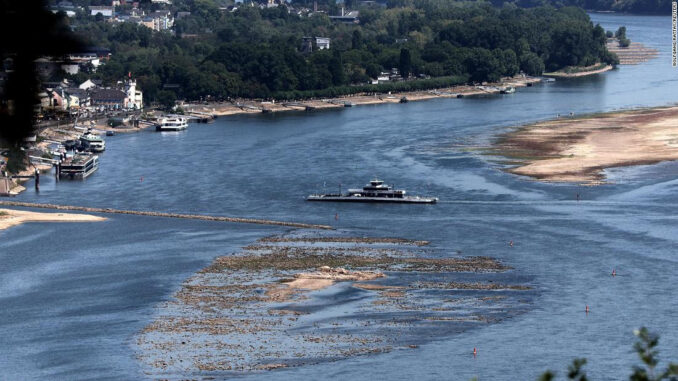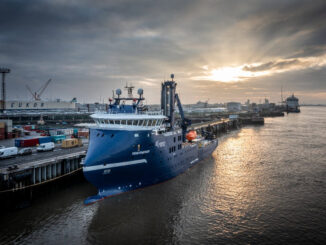
On Friday, the level of the Rhine river fell to a new low which will halt the flow of large amounts of critical river traffic. It has dealt a fresh blow to Germany, as it copes with the global inflation crisis, and a potential energy crisis heading into winter, due to Russia cutting supplies of natural gas.
In Germany the river is critical to the transport of 400,000 barrels of oil products, which travel the path it follows from the Amsterdam-Rotterdam-Antwerp region through Germany to Switzerland.
At Kaub, a vital waypoint west of Frankfurt, the water level has dropped below 40 centimeters, a critical level for shipping, and government data predicts it will continue to drop over the coming days. Below 40 centimeters, it is not economically feasible to run shipping operations for many carriers, as they will have to carry loads that are too light to cover the cost of the journey.
In shallower water, barges must lighten their loads to reduce their drafts. Low water levels on the Rhine periodically do affect shipping, however this is the lowest level seen since 1993.
By Tuesday government predictions are that the level will drop to 34 centimeters. The measure is actually a metric of navigability, and not an actual depth measurement.
The Rhine is a key shipping pathway for all of Europe, which has been struggling to secure waterborne natural gas supplies since Russia reduced exported gas flows to the continent. During the summer European nations fill up reserve holding facilities with natural gas which will be drawn down during the winter to heat homes, supply electricity, and fuel various manufacturing processes. Since Russia began cutting flows, European nations have been scrambling to ration current gas usage as they sought to import shipments of liquid natural gas from abroad.
German companies which use the Rhine for shipping, meanwhile have been taking steps to prepare for this crisis. BASF, a major chemical manufacturer has shifted shipments to rail travel, and has ordered special shallow-water barges. So far there has been no shipping disruptions for their products, however the company warns it cannot rule out a reduction in production rates at some facilities in the coming weeks.
Utility supplier Uniper said Thursday, it will not be able to run its plants at full capacity due to it being unable to have enough coal delivered to its facility. It had already warned of a production cut at its Staudinger-5 plant which will last until September due to a lack of coal at that facility.
Steelmaker Thyssenkrupp announced its crisis team is meeting daily, and it has already begun using ships with a lower draft to supply its mill in Duisburg.
But until weather patterns change and raise the level of the river, everyone will have to adapt to the new era of shortages.
The Daily Financial Trends



